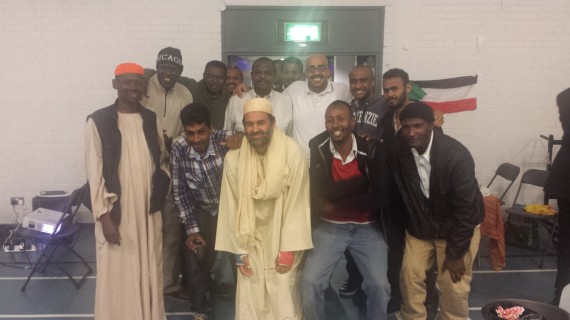
It’s a muggy Saturday evening in south Belfast and the summer sun, covered by dense cloud, is just setting. Out in front of Shaftesbury Leisure Centre, just off the lower Ormeau Road, children are running in circles around their parents squealing joyfully. Approaching the centre, women wearing pink, red and yellow hijabs push prams past a mural of Gaelic footballers and hurlers; men are gathered around the entrance shaking hands, embracing and chatting. A group walks past the men carrying platters of steaming halal goat and chicken. Tonight, the Sudanese Community Association Northern Ireland (SCANI) is hosting an open iftar dinner, the nightly breaking of the fast that happens during Ramadan. The majority of the hundred or so people gathered here have not eaten since the sun rose more than fifteen hours ago.
Inside the centre on the basketball court are a dozen tables set up with surrounding chairs. The hum of a bouncy-castle generator mixes with the screams of children enjoying themselves. My wife and I are welcomed by a friendly group of men, a few dressed in ankle-length thwabs, who sign us in and guide us to a table. Projected onto the wall is a large message: “Wishing everyone a Happy Ramadan. May the spirit of Ramadan illuminate the world and show us the way to peace and harmony.” The room is split into two sides, one with women, and one with men. Sitting at a table of women in hijabs is Alliance MLA, Anna Lo. With the men is Sinn Féin’s Alex Maskey. My wife, myself, and our female friend are all brought to one table. The traditional rules don’t apply to non-muslim guests.
We are joined at our table by an Algerian man who greets us and informs us he cannot shake hands, as he has just washed them in preparation for prayer. Earlier in the day, he had attended the Palestinian solidarity rally in Belfast city centre. He said he was disappointed that some had engaged in a small skirmish with counter demonstrators. As he talks, I notice a small Palestinian flag near the entrance. Before the conversation goes any further, however, we are informed it is time to queue for food.
While we dish up our plates with Sudanese delicacies, thirty or so men gather in the corner of the hall to pray. In liturgical unison, they bow and prostrate themselves. Our Algerian friend, who only seconds before had been a bundle of wild energy and enthusiastic conversation, is now focused on his prayers. His face is suddenly serene as he syncs into rhythm with the other men. When he returns, he is carrying a massive plate of goat, chicken, and salad and holding a stack of sliced white bread. He encourages my wife to share with him. “Once you’ve eaten off the same plate as someone, you cannot betray them.”
Dr. Mudawi Hassan, a sitting member of SCANI, tells me there are about 400 Sudanese living in Northern Ireland. It’s been three months since he’s seen his friend Hamza Edris, who is standing with us. Edris works in aeronautics for Bombardier and drove down tonight from Ballymeena, where he’s lived for twenty years. Edris jokes that half of Belfast’s children have been delivered by Hassan. This is how I discover that Hassan is a leading local gynaecologist.
“This event tonight” Hassan tells me, “is a gathering of the Sudanese community in regard to the Ramadan occasion. Ramadan is one of the pillars of Islam. Every year we meet like this during Ramadan, all the Sudanese in Northern Ireland.”
“It’s very easy to live here and very easy to integrate with the local people.” Cutting Hassan off mid sentence, Edris jumps in to say that Northern Ireland is the easiest place for muslims in the UK to integrate. Hassan finishes Edris’s sentence for him and says that the people in Northern Ireland are very kind. I asked about the intention of opening the iftar dinner to non-muslims. “It’s a part of the belief that you share with your neighbours. Share with the society that you are with,” says Hassan. “Again, everybody is busy, everybody is working, so its a chance for all of us to meet each other.”
In attendance with us is a friend of mine, Pádraic Fitzpatrick, who lived in Israel and Palestine for more than three years. Fitzpatrick, a Christian, is originally from Andersonstown in west Belfast, and speaks semi-fluent Hebrew and Arabic. He recently completed his Master’s in Islamic studies and will be delivering introduction to Islam courses within Northern Ireland’s charity sector beginning in the autumn. I asked him to summarise Ramadan for me. “Ramadan is a time when Muslims fast in accordance with their religious beliefs and practices. It is a time of community and joy, celebrating togetherness with one another.”
I hope that Edris and Hassan’s claims that integration has been easy for them is shared by others in Nothern Ireland’s Sudanese community. From some of my other conversations, I’m not sure this experience is universal. But it does signal that Northern Ireland is learning to make space for new cultures. Certainly nights like tonight provide an opportunity for friendships and sharing to occur, important in the development of any multi-cultural society.
I write about faith, democracy and culture from a Christian and centre-left perspective.
Discover more from Slugger O'Toole
Subscribe to get the latest posts to your email.